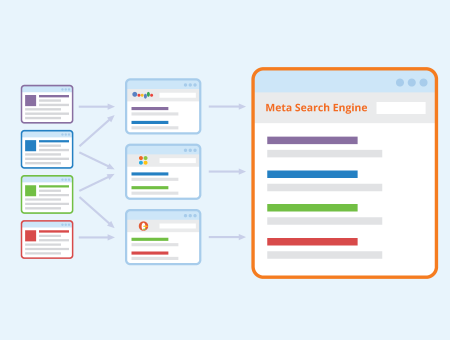Meta search engine

A meta search engine is a search engine that combines the search results of other search engines into one SERP. It is also called a search aggregator, since they aggregate the different search results from different search engines into a single list.
Although meta search engines used to be very popular for regular web searches, these days, they tend to be used more for industry or product-specific searches, like searching for flights or holidays.
SEO doesn’t usually cover meta search engines, although some SEO practitioners do offer SEO for certain meta search engines, like DuckDuckGo and various niche-targeted options.

An image of dogpile.com – a meta search engine that uses search results from Google, Bing, Yandex, and many others and compiles them into a single search results page.
How meta search engines work
Meta search engines work by searching for a user’s search term on different search engines and then compiling the results into a single page.
The searcher first enters a search term into the meta search engine. The meta search engine then performs the search on various different search engines and compiles the results into a single page, allowing the user to browse them all in one place.
In some cases, the search results page is ordered into different sections for each search engine used. However, this doesn’t have to be the case and you’ll often see meta search engines that don’t show which search engine each result came from.
Since they are still tasked with sorting the search results they find, a meta search engine will often still have its own reasonably complex sorting algorithm. In some cases, this can help improve the quality of the search results even more by stripping out duplicates from results and only showing the most relevant ones, for example.
The history of meta search engines
In the early days of the internet, search engines weren’t very advanced and it often took a lot of time to find the information you were looking for. By making it possible to view the results provided by a variety of different search engines, you could find what you were looking for much faster. This prevented you from having to use multiple search engines yourself, saving you a lot of time.
As Google, Bing, and other major search engines improved their results, the need for meta search engines reduced significantly. This led to the transition from broad meta search engines that searched the entire web and leveraged the major search engines available at that time, to meta search engines focusing on niche-specific topics, like flights and holiday destinations.
Since many websites have their own search engines for browsing the site, this allowed meta search engines to aggregate the results of various sites, adding value to their users once more.
Advantages
Although meta search engines used to have many advantages, like allowing you to browse more results quickly which reduced the time you spent searching for something, many of these advantages no longer hold true. Since Google and other major search engines already do a good job at finding the content you are looking for, quality has become more important than quantity and this has led SEOs and marketers to focus on these platforms instead.
One advantage that meta search engines still have is the anonymity they can offer users. Search engines like DuckDuckGo are classed as meta search engines and since they use other search engines to get the results themselves without you having to visit them, it allows you to get the same results without sharing your data.
They also allow you to search different search engines simultaneously, which may make it possible to discover content you otherwise wouldn’t have.
There are also some advantages that exist for the companies behind the meta search engines. One major advantage being that the processes they implement are far less complex, since certain tasks like crawling are done for them by other search engines.
Examples of meta search engines
- DuckDuckGo: A meta search engines that focuses on privacy and security
- DogPile: A traditional meta search engine that has been around since 1996
- Skyscanner: A meta search engine that focuses on flights, hotels, car rentals
SEO implications
Meta search engines used to have large implications for SEO’s, and they still might if optimization is focused on niche-specific search engines like Skyscanner, or privacy-focused meta search engines like DuckDuckGo.
Since meta search engines still need an algorithm to order the results they get from other search engines, there is still an opportunity for SEO practitioners to optimize websites and listings for these search engines.
That being said, the importance meta search engines have for SEO is just a fraction of what it used to be. Optimizing for the search engines that the meta search engines use themselves to find results will have a bigger impact on your visibility.
Related links
- https://www.searchenginewatch.com/2005/03/23/metacrawlers-and-metasearch-engines/
- https://www.researchgate.net/publication/255394777_Metasearch_Engines
Similar articles
